Friday, October 18, 2024
In this blog, you'll learn the basics of ESG questionnaires, understand the different types you might encounter, and discover how to gather the necessary data for reporting.

Maikel Fontein
Oct 18, 2024
7
min
At Passionfruit, we know that ESG (Environmental, Social, Governance) questionnaires can feel like a big task, but they offer a fantastic opportunity to showcase your company's commitment to sustainability. We're here to make ESG questionnaires easy, practical, and less overwhelming by simplifying ESG data collection. In this guide, we’ll walk you through what ESG questionnaires are, why they matter, and how you can tackle them efficiently—without the headaches. We’ll also point out how ESG data fits into the broader sustainability picture, all while staying aligned with European Sustainability Reporting Standards (ESRS).
What Are ESG Questionnaires?
Let’s start with the basics. An ESG questionnaire is essentially a structured list of questions that your company might receive from customers, investors, or regulators. They’re designed to help evaluate your environmental, social, and governance performance. Think of them as a way for you to communicate how your company operates in these key areas, meeting the growing expectations of stakeholders who care about sustainability.
Why ESG Questionnaires Matter for Sustainability and Compliance
ESG questionnaires are more than just a compliance exercise—they’re an opportunity. By answering ESG questionnaires, you can track your sustainability progress, show your commitment to transparency, and stay ahead in an ever-evolving market. They also help build trust with customers and investors, making your company more attractive to business partners and stakeholders who value responsible practices.
What Types of ESG Questionnaires Are There?
We know that ESG questionnaires come in all shapes and sizes. Here are the main types you might encounter:
Customer Questionnaires: These are typically sent by your customers to help them improve their own operations or comply with regulations like EUDR and CSRD. Whether it’s an online portal, an Excel file, or a PDF, expect questions that could cover your entire group, a specific entity, or even a product line.
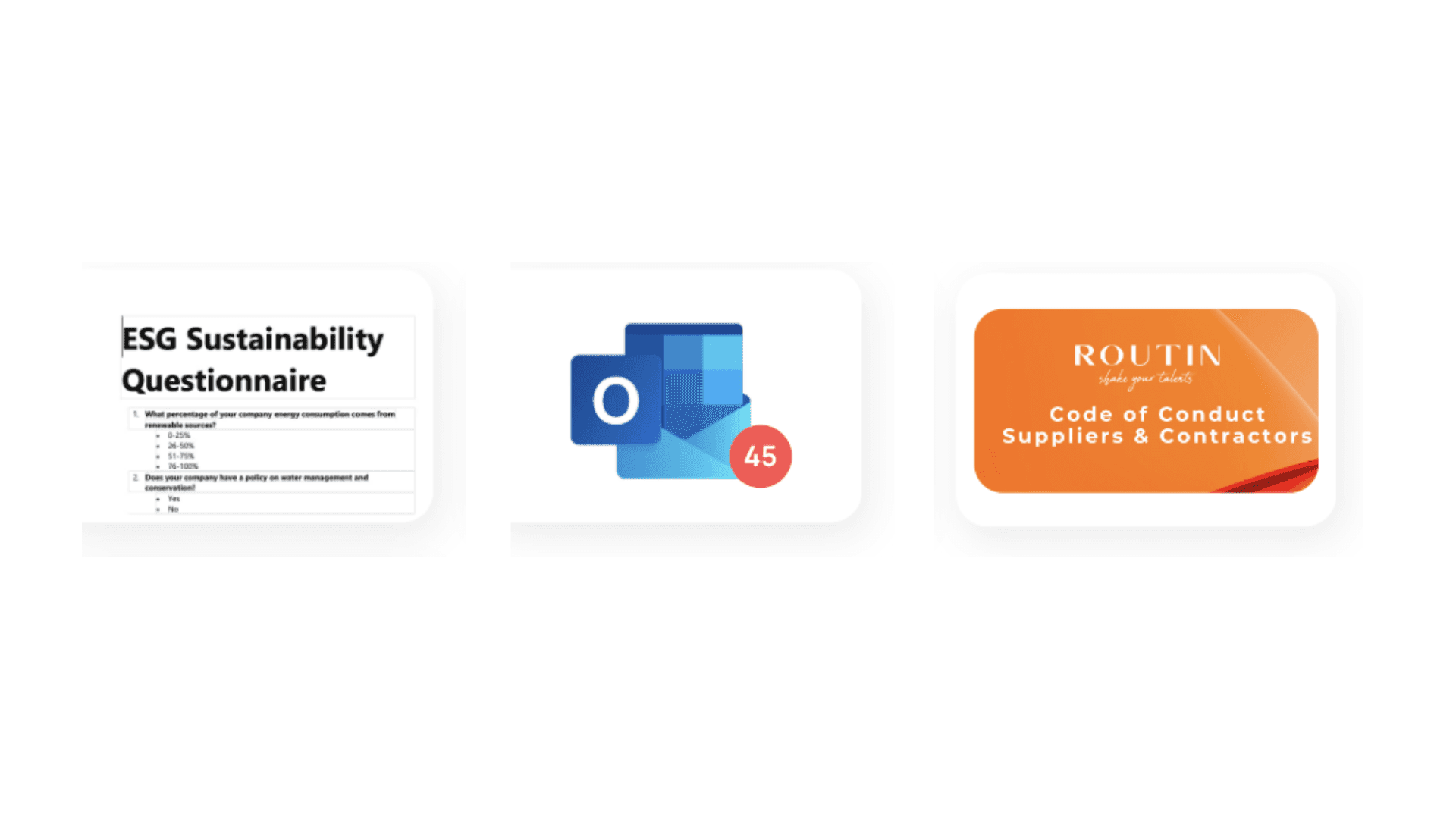
Voluntary Framework Questionnaires: These include well-known frameworks like CDP, EcoVadis, and B-Corp. While not mandatory, many companies complete these questionnaires to boost their own operations or because customers ask for it. Plus, compliance with these frameworks enhances your reputation.
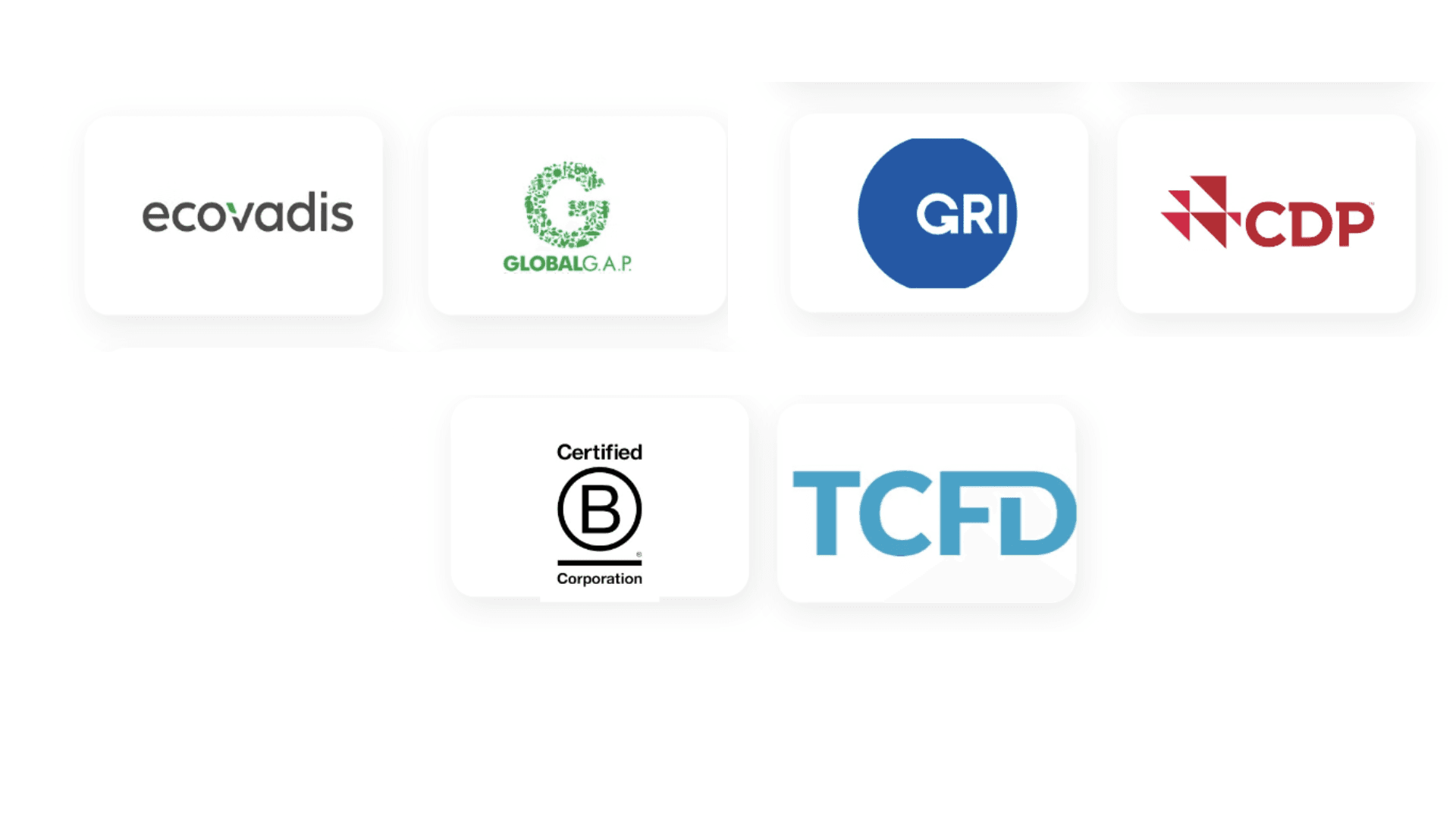
Regulatory Questionnaires: Standards like CSRD, CSDDD, and EUDR include questions mapping ESG data points to relevant ESRS topics. These might not always look like typical questionnaires, but trust us, they feel like one when you’re mapping out all the data points.
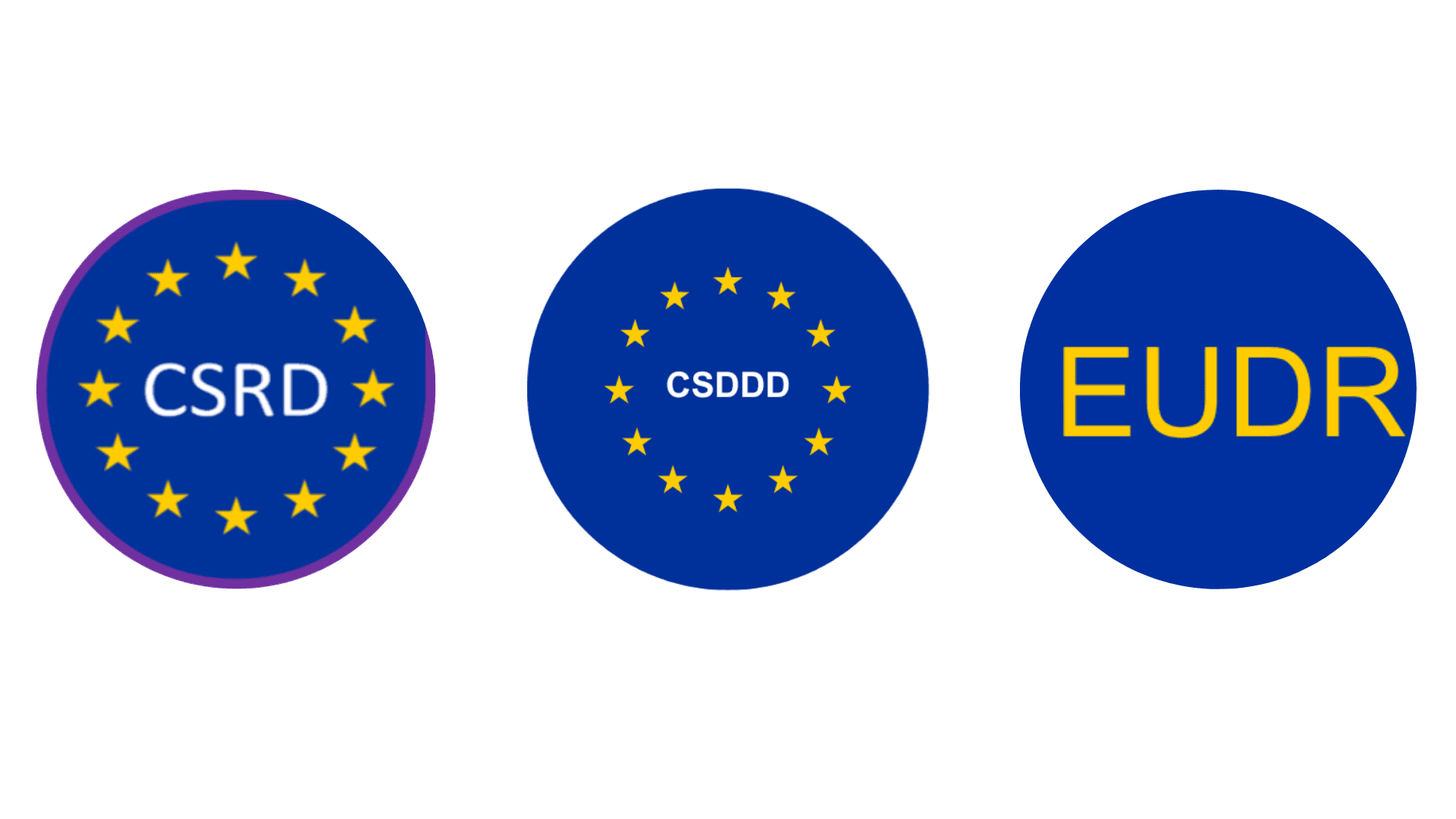
Key ESG Questionnaire Components for Effective Data Reporting
Now, let’s break down what you’re likely to see in an ESG questionnaire. The questions will vary depending on your industry, but here are some common themes across environmental, social, and governance factors, along with the documents you’ll need and links to the relevant ESRS topics.
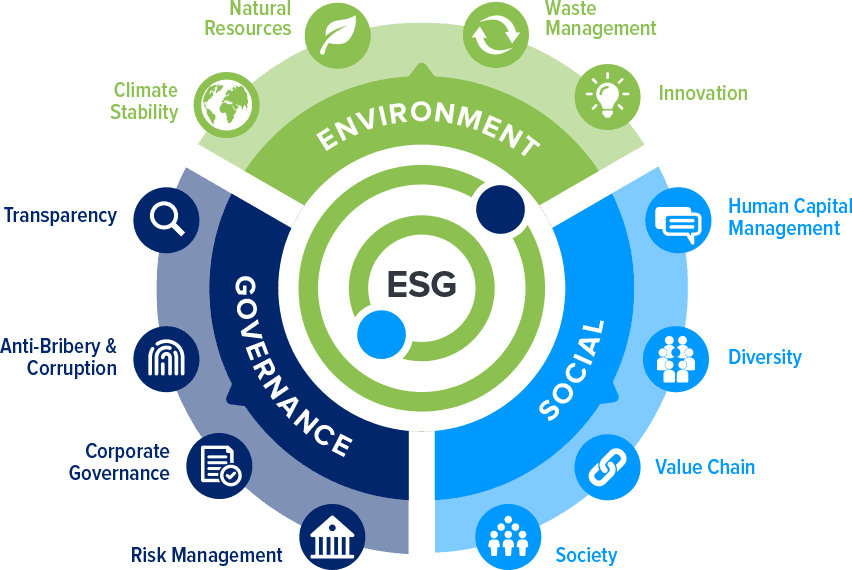
Environmental Factors 🌍
Environmental questions focus on how your company manages its impact on natural resources, pollution, and energy use. Almost every questionnaire will include something about CO2 emissions, so be prepared to report this either at the company or product level.
Example Topics:
Example Question: “How does your company manage water consumption, and what measures are in place to minimize usage?”
Documents to Prepare: Water management policy, water consumption data, reports on water-saving technologies, and wastewater recycling strategies.
Relevant ESRS Topic: ESRS E3 – Water and Marine Resources.
Climate Change and CO2 Emissions
Example Question: “What were your company’s total CO2 emissions in 2023? Please also provide a breakdown by factory.”
Documents to Prepare: Emissions reports, pollution control policies, certifications (e.g., ISO 14001), LCA assessments, and emissions reduction plans.
Relevant ESRS Topic: ESRS E1 – Climate Change, ESRS E5 – Resource Use and Circular Economy.
Traceability and Supply Chain Monitoring (Linked to EUDR)
Example Question: “What systems do you have in place to trace the origin of commodities like palm oil, soy, cattle, and timber to ensure they are deforestation-free?”
Documents to Prepare: Supplier audit reports, traceability systems data, certifications (e.g., Rainforest Alliance, FSC), and blockchain-based traceability documentation.
Relevant ESRS Topic: ESRS E4 – Biodiversity and Ecosystems.
Social Factors 👥
Social questions dive into how your company treats its employees, suppliers, and customers. Tackling these topics shows your dedication to human rights, worker safety, and social responsibility.
Example Topics:
Example Question: “What policies are in place to promote diversity and inclusion in your company, and how do you measure success?”
Documents to Prepare: Diversity policies, workforce demographic data, evidence of diversity training programs, and gender pay gap reports.
Relevant ESRS Topic: ESRS S1 – Own Workforce.
Human Rights in the Supply Chain
Example Question: “How does your company ensure fair labor practices and respect for human rights within your supply chain?”
Documents to Prepare: Supplier code of conduct, third-party audit reports, human rights policies, and labor compliance documents.
Relevant ESRS Topic: ESRS S2 – Workers in the Value Chain.
Consumer Privacy and Data Protection
Example Question: “How does your company ensure the protection of consumer data, and what systems are in place to prevent data breaches?”
Documents to Prepare: Data privacy policies, GDPR compliance documentation, cybersecurity audits, consumer consent forms, and incident response plans
.Relevant ESRS Topic: ESRS S4 – Consumers and End-Users.
Governance Factors 🏛️
Governance questions focus on how your company is structured, how it manages risks, and what ethical practices are in place. Strong governance is key to ensuring long-term sustainability and accountability.
Example Topics:
Board Composition and Oversight
Example Question: “What percentage of your board members are independent, and how do they oversee ESG risks and opportunities?”
Documents to Prepare: Board composition records, governance policies, board meeting minutes, and ESG risk assessments.
Relevant ESRS Topic: ESRS G1 – Governance, Risk Management, and Internal Control.
Example Question: “What steps has your company implemented to prevent corruption and ensure ethical business practices?”
Documents to Prepare: Anti-corruption policies, internal audit reports, training records, and whistleblower procedures.
Relevant ESRS Topic: ESRS G2 – Business Conduct.
Example Question: “How does your company integrate ESG risks into its overall risk management framework, and what processes are in place to address them?”
Documents to Prepare: Risk management framework, ESG risk assessments, and scenario analyses for climate-related risks.
Relevant ESRS Topic: ESRS G1 – Governance, Risk Management, and Internal Control.
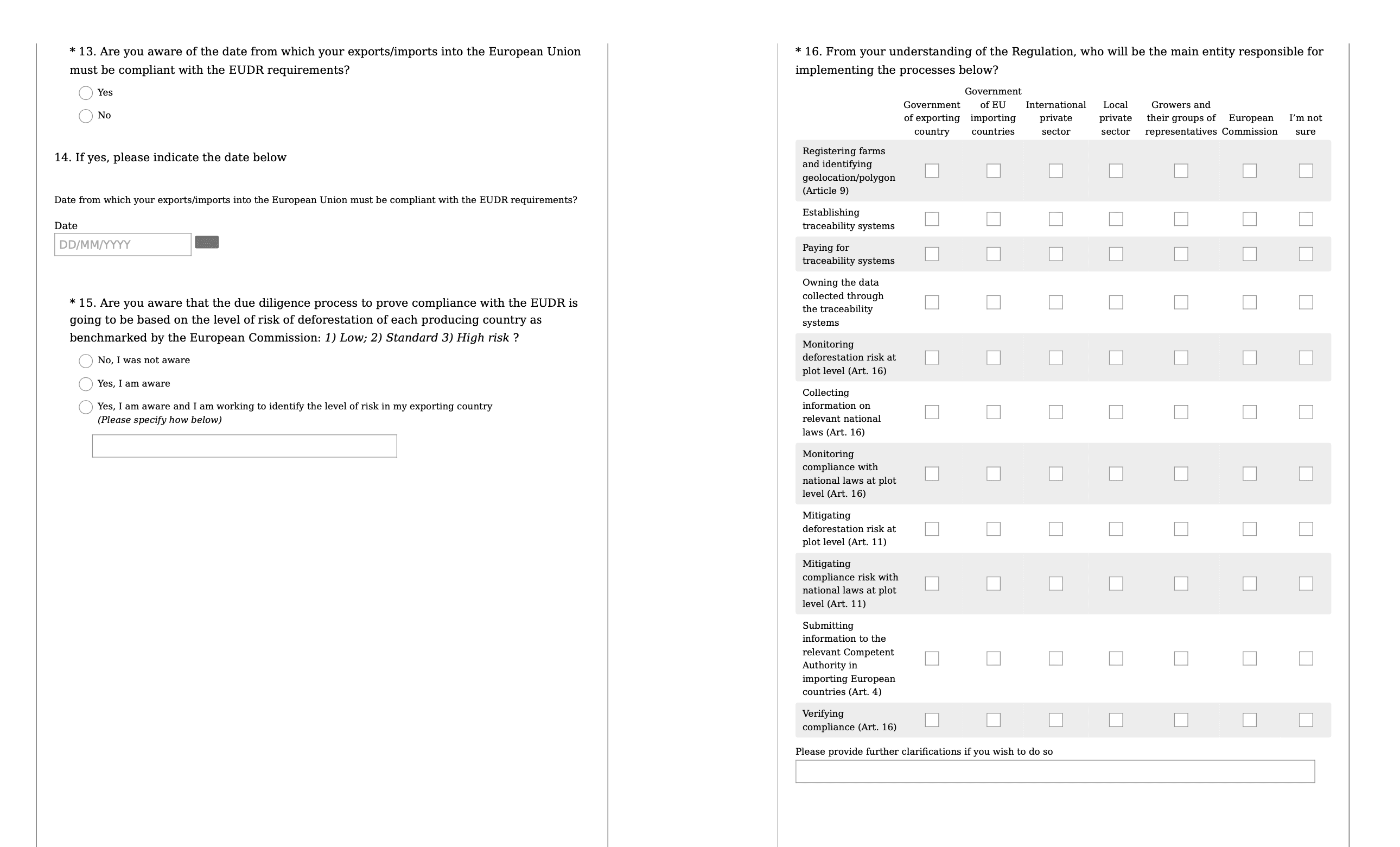
ESG Data Collection Strategies
We know that ESG data collection can feel like a marathon, but it doesn’t have to be overwhelming if you approach it the right way. By combining internal investigation with external exploration, you can streamline the process and ensure you're gathering the most relevant data.
Internal Data Collection: Start with What You Already Have
You don’t need to reinvent the wheel! Most companies already track much of the ESG-related data you’ll need.
Existing Reports and Documents: Check your company’s annual report, sustainability reports, Code of Conduct, and employee handbooks. These documents often contain valuable information on energy use, employee diversity, waste management, and more.
Consult with Relevant Departments: Departments like Finance, HR, and Operations hold critical pieces of your ESG puzzle. For example, talk to your facilities manager about energy use, your HR department for diversity data, and your legal team for governance policies.
A Small Warning: We know that not everyone in the company will engage immediately. We’ll dive deeper into how to manage that challenge soon.
Save Approved Answers: It sounds simple, but making a list of approved answers and storing them is crucial. This allows you to review them over time and maintain consistency in your reporting.
Passionfruit acts as your central knowledge base. All your compliance and ESG-related documents, policies, and certifications are stored in one easily accessible location. No more searching through endless files!
External Data Collection: Expand Your Reach
Once you’ve gathered internal data, it’s time to explore external sources to fill in any gaps and benchmark your performance.
Benchmarking Bonanza: See how you compare to competitors or understand what your customers really mean. Review their ESG reports and disclosures to understand what’s considered best practice in your industry.
ESG Rating Agencies: Organizations like EcoVadis or CDP specialize in ESG ratings and assessments. They can provide a clearer picture of where your company stands.
Partnerships: Teaming up with NGOs or industry associations can provide access to specialized data and insights. These partners can support your efforts on specific ESG issues and help you stay informed on trends.
Reporting Frameworks and Regulations: Familiarize yourself with frameworks and regulations like the GRI (Global Reporting Initiative), which provides standards for sustainability reporting, the EUDR (European Union Deforestation Regulation), which ensures commodities used in your supply chain aren’t linked to deforestation, and the CSRD (Corporate Sustainability Reporting Directive), which sets comprehensive sustainability reporting standards. If you need to focus on one, prioritize organizing your data in line with ESRS (European Sustainability Reporting Standards) data points, as required under the CSRD.
Technology and Tools: Work Smarter, Not Harder
Let’s face it—ESG data collection can get complicated, especially when you’re juggling multiple formats and data points. That’s where technology comes in. Using automation tools like Passionfruit can take a lot of the stress out of the process. These tools help keep your data accurate and up to date, make it easy to find missing documents, instantly show which questions you already have answers for, and highlight where gaps exist. Plus, they simplify the task of organizing everything so it’s audit-ready and aligned with ESRS topics.
If full automation isn’t an option right now, you can still make things easier by organizing your documents by ESRS topics in a shared space like SharePoint. Assign someone to oversee document management to ensure everything is easy to access when you need it.
The Benefits of Transparency and Completing ESG Questionnaires
Better Business Relationships: Transparency helps build trust with stakeholders, improving your company’s reputation and competitiveness.
Access to Financing: A strong ESG profile makes your company more attractive to investors and opens up opportunities for sustainable financing.
Improved Operations: Addressing ESG issues can help you identify and mitigate risks, protecting your company’s long-term value.
Common Challenges and How to Overcome Them
Data Gaps: Smaller businesses might have gaps in their data. Start with what you have and build better processes over time.
Document Organization: You might need around 10 different documents to answer an ESG questionnaire. Make sure your documents are easy to find.
Multiple Formats: Every customer might ask for a different format—Excel, PDF, or an online portal. It can be frustrating, but automation tools like Passionfruit can help simplify this.
Best Practices for ESG Questionnaire Success
Assign Clear Responsibilities: Make sure specific individuals or teams are responsible for gathering and managing ESG data. Establish clear workflows.
Engage Stakeholders Early: Don’t wait until the last minute—start collecting feedback from employees, suppliers, and customers early on.
Automate Where Possible: Let automation handle the repetitive tasks of finding information and formatting answers, so you can focus on higher-value work.
Leverage Insights: Over time, save, organize, and analyze your answers to spot trends in what your customers are asking. This data can be incredibly useful for your CSRD reporting.
Conclusion: ESG Questionnaires as a Strategic Tool
ESG questionnaires aren’t just a checkbox for compliance, although they might seem like that —they’re a chance to improve your sustainability practices, build trust, and lead by example. By organizing your data, automating where possible, and focusing on what matters, you can make ESG data collection and sharing your insights a powerful tool for your business.
At Passionfruit, we’re here to help. Let us support you in streamlining and automating your ESG answering processes and making compliance easier. For every part of your business. Reach out today to get started on your sustainability journey.




